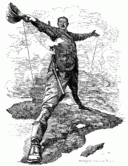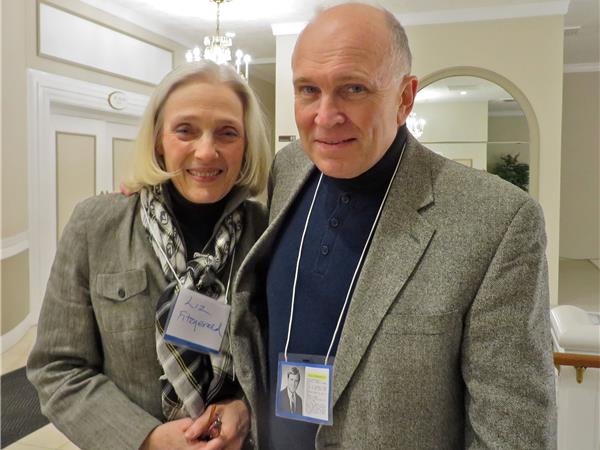The Sordid History of British Manipulation of American Democracy Series: Read it and weep!

British imperialist Cecil Rhodes was the consummate empire builder. The Rhodes Scholarship continues its influence on American thinking to this day.
(Image by Edward Linley Sambourne (1844–1910), Author: Edward Linley Sambourne (1844–1910)) Details Source DMCA
"Brzezinski however couldn't do much until the death of Dubs. And the death of Dubs removed the last obstacle. Then came Herat" They killed a lot of Russians and the Russians were very upset. But it gave a shot in the arm to the resistance in this country [the U.S.]. That was March of '79. So the coincidence of Dubs' death and the Herat uprising gave Brzezinski control of the policy from then on."
Interview: Selig Harrison February 18, 1993
The kidnapping and assassination of Ambassador Adolph Dubs on February 14, 1979 at the Kabul Hotel ended any meaningful effort by the U.S. to prevent a Soviet military intervention in Afghanistan. The death was employed however from that day forward by President Carter's National Security Advisor Zbigniew Brzezinski as the opportunity to increase the level of provocation for luring the Soviets into their own "Vietnam quagmire" and keeping them pinned down for as long as possible. Because of "Spike" Dubs' death, Zbigniew Brzezinski finally got control of foreign policy; got his hard line neoconservative policy toward the Soviet Union pushed through, ended support for de'tente once and for all, and put Strategic Arms Limitation on hold. Hafizullah Amin continued to seize power for himself, sew discord throughout the countryside with his education and land reform programs, fracture his political party the PDPA and game the Soviet leadership by asking them to intervene militarily fourteen times, knowing full well they were dead set against a military intervention.
Selig Harrison writes in his 1995 book with Diego Cordovez, Out of Afghanistan, "On the one hand, he [Amin] continued to call upon massive Soviet help in financing his regime, equipping it militarily and providing technical personnel for military operations against rebels. On the other, he resisted Soviet control, brushing aside pressure for a slowdown in reforms and for greater Soviet involvement in running the secret police and the military."
Continuing his coup d'e'tat in Washington, Brzezinski and his military assistant General William Odom proceeded with plans for the radical transformation of America's nuclear doctrine of Mutual Assured Destruction -- MAD (directed mainly at the Soviet Union) into one of nuclear "war-fighting" through a series of Presidential Directives. Most of these directives excluded the State Department in the decision-making and remain in force to this day. Based entirely on the fallacious assumption that the Soviet Union believed they could fight and win a nuclear war, President Carter, Brzezinski and General William Odom set out to win one of their own and build the weapons with which to do it.
Contrary to Jimmy Carter's glowing public image as a peace-president and future Nobel Peace Prize winner, behind the scenes the former Navy man would embrace Brzezinski's vision of an inevitable conflict with the Soviet Empire and relish his role as the nuclear war-fighting Commander in Chief fighting it to his last breath.
Author Tim Weiner quotes General Odom in his 1990 expose', Blank Check, "Carter became the first President to immerse himself in the details of nuclear war-fighting scenarios. The President 'really got into the procedures, ran through numerous scenarios, and became very comfortable with it,' Odom told a Harvard seminar in 1980." Knowledge of Carter's dark side has gone unrecognized over the years but despite the end of the Cold War in 1991, the horrifying product of his decision-making has remained intact with each succeeding administration. Presidential Directives (PDs)53, 58 and 59 didn't just lower the threshold for nuclear weapons use, they encouraged it; making it appear probable that America's elites could save themselves in a protracted nuclear war of up to six months, regardless of the consequences to the nation or its population. Based on an invented threat of nuclear annihilation carried into the Carter administration by Brzezinski, PD 59 would form the groundwork of the unnecessary Reagan buildup in the 1980s which would then form the groundwork of the post-Soviet Wolfowitz Doctrine of American imperial supremacy that followed. As Tim Weiner noted with irony in 1990, "The President who vowed to rid the world of warheads wound up signing the first truly significant war-fighting plan since the heyday of Curtis LeMay."
But the real irony of the Carter presidency wasn't in his reprise of the mad bomber role from Doctor Strangelove; the real irony was that the greatest success of his presidency - the U.S- Egypt-Israeli peace treaty of 1979 - was not arranged by his skill at diplomacy or his desire for a Middle East peace but by an off the books agency doing Zbigniew Brzezinski's dirty work in Afghanistan known as the Safari Club. John K. Cooley writes in his 1999 expose' on U.S.-backed terrorism Unholy Wars, "Just before the Afghanistan war began, and because the Safari Club was keeping both Israeli and US intelligence informed of its actions, the Club was able to help bring about President Sadat's historic peacemaking visit of November 1977 to Jerusalem, leading to the US-Egyptian-Israeli peace treaty of 1979... Morocco's representative in the Safari Club hand-carried Rabin's letter to Sadat. King Hassan then sponsored the first secret meeting in Morocco--
Egypt's Anwar Sadat would play an important role in the upcoming war in Afghanistan, supplying old Soviet weapons to Zbigniew Brzezinski's so-called Freedom Fighters in an effort to fool the American public and Congress into thinking the weapons came from Soviet and Afghan defectors surrendering to CIA-backed rebels. Sadat would upset his handlers in Washington in September 1981when he spilled the beans on the secret operation and would die by assassination exactly two weeks later, but at that point his usefulness to the Safari Club had ended.
President Carter hadn't been assassinated as "Spike" Dubs had been and Hafizullah Amin would soon be, but he was served up as an unwitting participant in his own coup d'e'tat before he'd even entered the Oval office. In the wake of the Church Committee hearings and Watergate and with the President's knowledge and assistance, Zbigniew Brzezinski had rewired authority for covert action from the State Department to the National Security Council in what has been described as "a bureaucratic first strike of the first order". A Cercle of old European power had then detached the administration, sealed off the CIA in Washington from further damage and run its operations out of the Middle East. The head of French external intelligence, Pinay Cercle member and Safari Club coordinator Alexandre de Marenches had stepped in to fill the breach during the crisis, aided the operation through the Bank of Commerce and Credit International and set the stage for a Soviet invasion of Afghanistan that would drag on for nearly 10 years. John K. Cooley writes, "The Safari Club player who probably helped most to draw the US into the Afghan adventure was Count Alexandre de Marenches" He had cooperated actively with the United States in warfare and covert operations since World War II. He believed it to be of advantage to France, as well as to his American friends and allies, to form a group like the Safari Club to protect and advance Western interests in the Third World."
The death of Ambassador Dubs, the Iran hostage crisis and the Soviet invasion of Afghanistan in late December 1979 doomed Carter's reelection to failure. Afghanistan was soon to become the self-fulfilling prophecy of Soviet iniquity that the neoconservative, right-wing alliance had been trying to create for decades; a permanent, ongoing crisis in U.S.-Soviet relations which it had precipitated and then claimed to uncover and respond to. Alexandre De Marenches had done his part to put all the pieces in place. Brian Crozier and Robert Moss had written the script and Brzezinski had sold it to the highest levels of the American government. De Marenches had even knowingly tipped off his cousin, Newsweek's Arnaud de Borchgrave to be in Kabul ahead of the invasion to catch the action; action that the President of the United States (Carter) would later claim he had no foreknowledge of. But without the constant propagandizing of Brian Crozier and his prote'ge' Robert Moss working behind the scenes with their influential colleagues, the sale of a right-wing coup d'e'tat of the U.S. might never have taken off.
1980: THE SPIKE
If anything represented the payoff to the decade of neoconservative/right-wing subversion being worked on the American psyche by the Institute for the Study of Conflict, it was the 1980 publication of the fiction/fantasy/spy-novel The Spike. Whether or not the title was a perverse inside joke or a veiled reference to the death of American Ambassador "Spike" Dubs in Kabul the year before, The Spike would prove to be the Pinay Cercle's final nail in the coffin of U.S./Soviet relations. Viewed in hindsight The Spike plays out as poorly written paranoid political propaganda masquerading as fact. But viewed from the fevered perspective of the American mass media of 1980 in the run up to the election of Ronald Reagan, the #1 bestselling novel by Arnaud de Borchgrave and Robert Moss was nothing less than proof of the KGB's evil "plot to destroy the U.S., exposed."
"A humdinger by two of the savviest foreign correspondents in the business." Wrote William Safire in the New York Times. "A thundering rebuttal to the architects of de'tente, critics of the CIA and editors of the opinion-forming, powerhouse newspapers from the East." Wrote the Dallas Morning News. "A thriller that is several steps ahead of the headlines." Wrote the San Francisco Chronicle.
(Note: You can view every article as one long page if you sign up as an Advocate Member, or higher).





